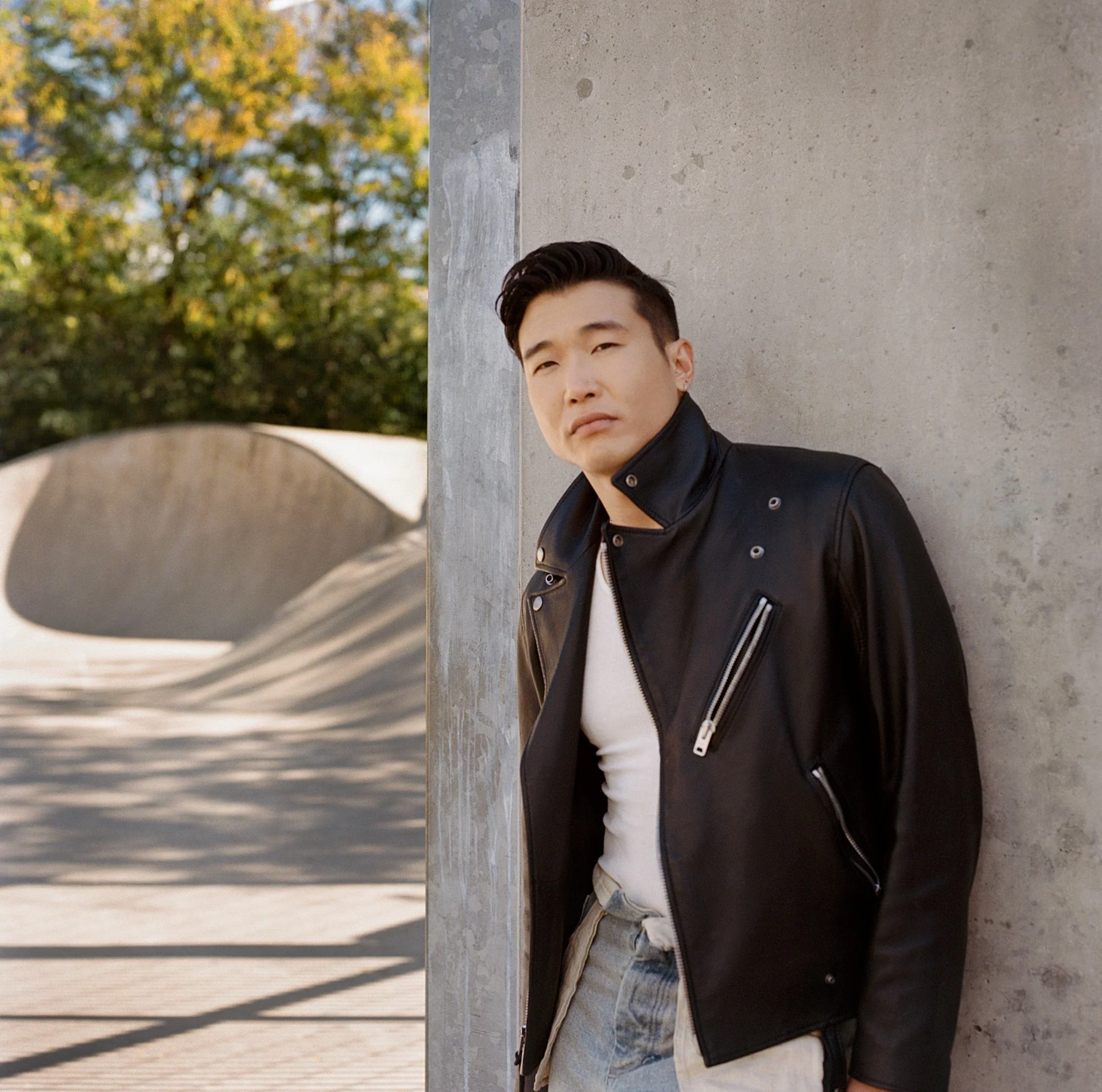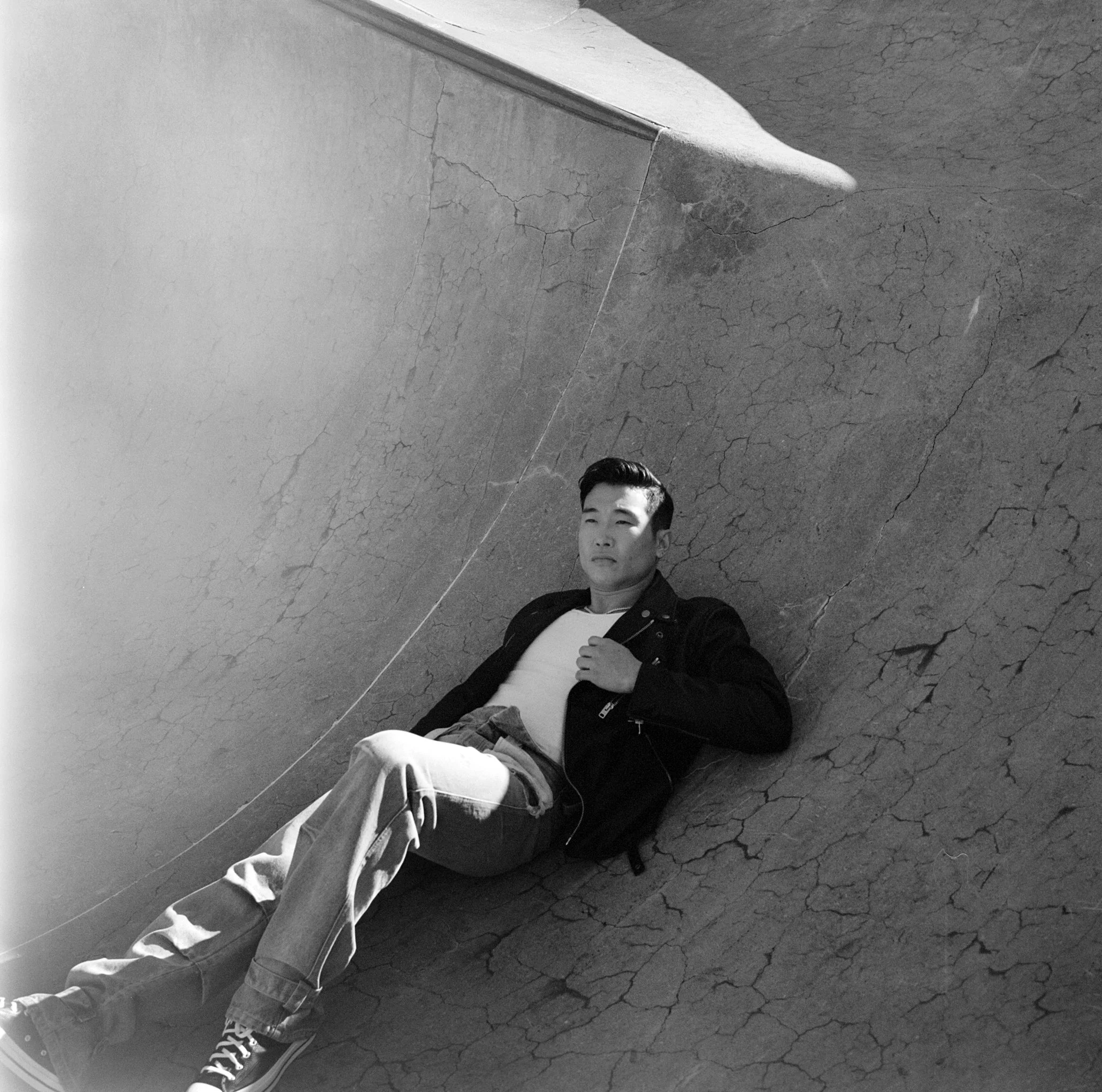
THE
JOURNAL
If you’ve watched American comedy evolve over the last decade, chances are you’ve already crossed paths with Joel Kim Booster. Maybe it was Fire Island, the Hulu feature he wrote and starred in, with Bowen Yang as his on-screen best friend. Maybe it was Loot, where he plays corporate fixer Nicholas opposite Maya Rudolph. Or maybe it was his stand-up specials, his season-long hosting role on Bravo’s Love Hotel, or a glimpse of what’s coming next in the Scrubs reboot.
Born on Jeju Island and raised in the Midwest, Joel learned early how to read a room and how to turn observation into something with an edge. Comedy became the place where all of that clicked, a space where instinct meets pressure and where a crowd tells you the truth in real time.
What keeps him steady is joy, the real-life version. Friends who show up. Queer spaces that feel like home. Dance floors, late nights, the kind of group chat that holds a week together. When he mentions his husband-to-be, the clarity is unmistakable. It’s the anchor beneath the rest.
His work has stretched as he has. The early sets rooted in personal history have widened into something broader, shaped by the world he moves through and the stories he wants to amplify. Offstage, he is thinking about longevity: producing, championing other voices, and building the kind of creative ecosystem he didn’t see growing up.
What emerges is not just a comic mid-stride. It is an artist paying close attention, trusting his gut, and stepping into a chapter that feels bigger than the last.
COMEDY 2025
“I like that even within Korean culture, I was born on an island that bucked tradition. I’m proud of that.”
Do you remember the first laugh that felt like fuel and cracked something open in you?
It was my first time ever doing stand-up. It was part of a variety show fundraiser at a theatre I worked for. They needed someone to fill a slot, and I had been thinking about trying it for a few months, so I gave it a shot. I crushed that first time, and I don’t think that if I hadn’t, I’d still be doing it. You’re always chasing that feeling you had the first time you crush.
When did it first hit you that comedy could be your future and not just something you loved doing?
Probably the first time I did stand-up in New York. In Chicago, it felt like a hobby, a creative outlet I didn’t take seriously. But the first time I visited New York and did it, it was like a switch flipped. New York is the greatest stand-up city, bar none. And the energy you get when you perform there, especially as a young comic, is unlike anywhere else. I remember the first few shows I did there; something about that city really pumps you full of delusion about making it.

“I want to produce more. Build an empire. Find a way to uplift voices that are telling stories I can’t.”
Do you ever miss anything from those early comedy days in Chicago?
I miss the experimentation. I wasn’t worried about who was in the audience back then. I could take big swings, fail massively, and it didn’t feel like it counted toward everything. The stakes feel higher in NY and LA.
Where do you tend to find new ideas—by looking inward at your own life or out in the world?
It changes. When I first started out, so much of what I talked about was autobiographical. I pulled almost everything from my life. All my jokes were stories from my life. I still pull from personal experience, and I love to tell a story on stage, but so much of it now is about how I move through the world, what’s going on in it, and my point of view on it.
Who makes you laugh the most when the camera isn’t rolling?
It’s cheesy, but my husband-to-be makes me laugh harder and more often than anyone else. I’m around a lot of very funny people all the time, but when we’re home alone, we have our own language almost. He gets me on a cellular level and knows what’s going to make me laugh better than anyone.
Your film Fire Island clearly meant a lot to so many people—what did it mean to you to make it?
Getting to tell such a granular story, heavily inspired by my own life and an homage to my favorite writer [Jane Austen] — it all felt impossible at various points in time, and to actually get it made felt like a miracle. I’m not sure if I’d be able to do it today; that’s how much the market has changed in the last couple of years. Queer stories are harder to sell; stories that aren’t necessarily about the broadest audience are harder to sell. Studios and networks aren’t taking risks as much as they used to, so I’m very grateful it happened when it did. A part of me feels like I’ll never get to make something quite as specific again, so I really treasure that.
Jacket by 5000
How do you stay connected to the joy of performing when schedules and expectations get louder?
It’s the immediacy that brings me back. In that moment, when I’m on stage, the audience is either laughing or they’re not. It’s that simple. There are no studio politics or network notes or anyone else getting in between us. Success in this industry is not really about merit all the time, but if I can make an audience laugh in the moment, then you can’t really tell me I didn’t earn it. People don’t laugh because of “woke” or because they’re fans — not for an hour straight. Stand-up keeps me honest.
What helps you stay hopeful or grounded when the world doesn’t always feel kind to the communities you’re part of?
I think connecting with my community — whether it’s a dance floor or a game night — making sure we’re not centering trauma or conflict but just simple joy, is what keeps me energized.
Jacket by 5000
Are there causes that have become especially important to you as your platform has grown?
I’m a bleeding heart leftist to my core, and that hasn’t changed with the platform. I’m concerned about justice, globally, and have been very vocal in my support of the Palestinian people in the midst of the genocide that’s happening over there—specifically as it has been backed by our own government. I think people miss that part a lot. They like to bring up conflicts or wars that America isn’t actively funding and wonder why I’m not talking about that—what about Sudan or Congo? To my knowledge, America isn’t actively stoking the genocides happening there. Of course it’s devastating to me, but when our government is actively supporting the country committing the genocide, it feels more urgent to speak on that. We have the power to stop that. That isn’t the case with the other conflicts people who support Israel cynically bring up as a gotcha. We’re all just doing our best. I’ll never be a perfect advocate, but I’m trying. Listen more, check the sources, and provide ways for people to help—not just rage-bait. That’s how I try to utilize the platform.

Joining the new Scrubs series brings a built-in sense of nostalgia. What drew you toward that role?
I love to work. I’m very lucky that this job, in particular, is something I’m very excited to do. The character is a bit of an antagonist for Zach Braff’s JD. I’m used to playing snarky guys with a heart of gold, but without giving too much away, Dr. Park is definitely a little bit more of the villain, and that’s a lot of fun to play.
What does your Korean heritage mean to you, and how do you carry that curiosity forward?
I’m immensely proud of where I’m from. Specifically, the island where I was born—Jeju—is a bit of an anomaly in the region. Lots of weird little historical facts and a culture unique to the island. I like that even within Korean culture, I was born on an island that bucked tradition. I’m proud of that. I feel like that instinct is baked into my DNA in a way, and I want to honor that in everything I do.
What do you hold close that fame can’t touch?
My relationship. I have something so rare and precious, and that is finding someone who sees me and loves me deeply, and a lot of people online or out in the world want to denigrate that or diminish it. But when I’m at home with him, I feel braver and stronger and damn near untouchable.
What are you curious about building in the next few years, creatively or personally?
I want to continue to focus on my own creative work, but I want to produce more. Build an empire. Find a way to uplift voices that are telling stories I can’t. I had a lot of help getting here. Now I just want to pay it forward.
For more on Joel, follow on Instagram @ihatejoelkim








